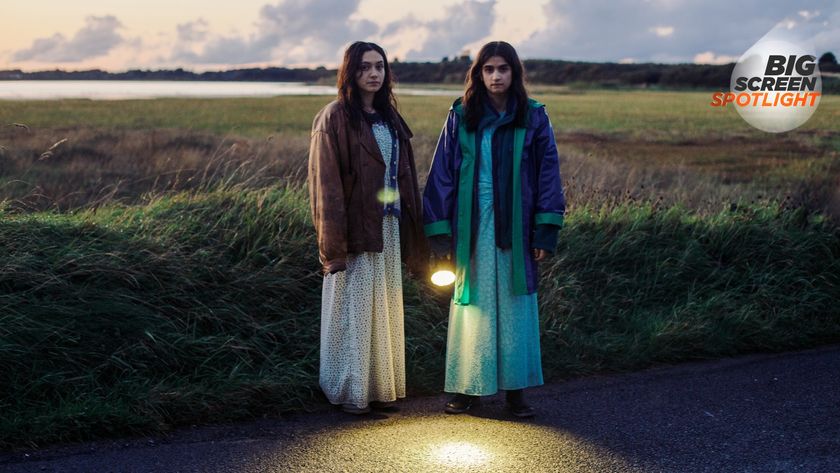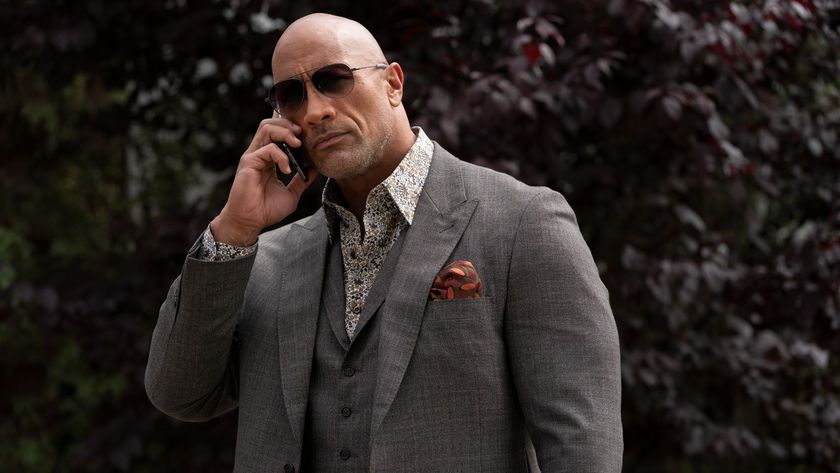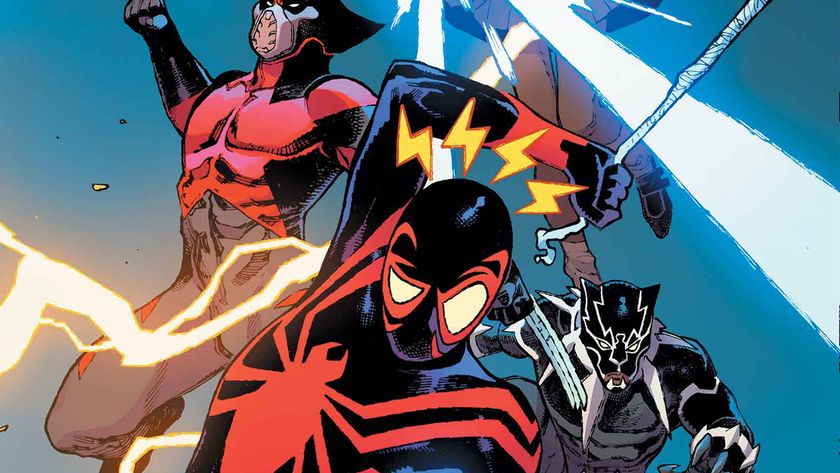Jake Gyllenhaal and Dar Salim on why The Covenant isn't your typical Guy Ritchie film
EXCLUSIVE: The actor duo tell us all about their new war drama and Ritchie's unique way of working
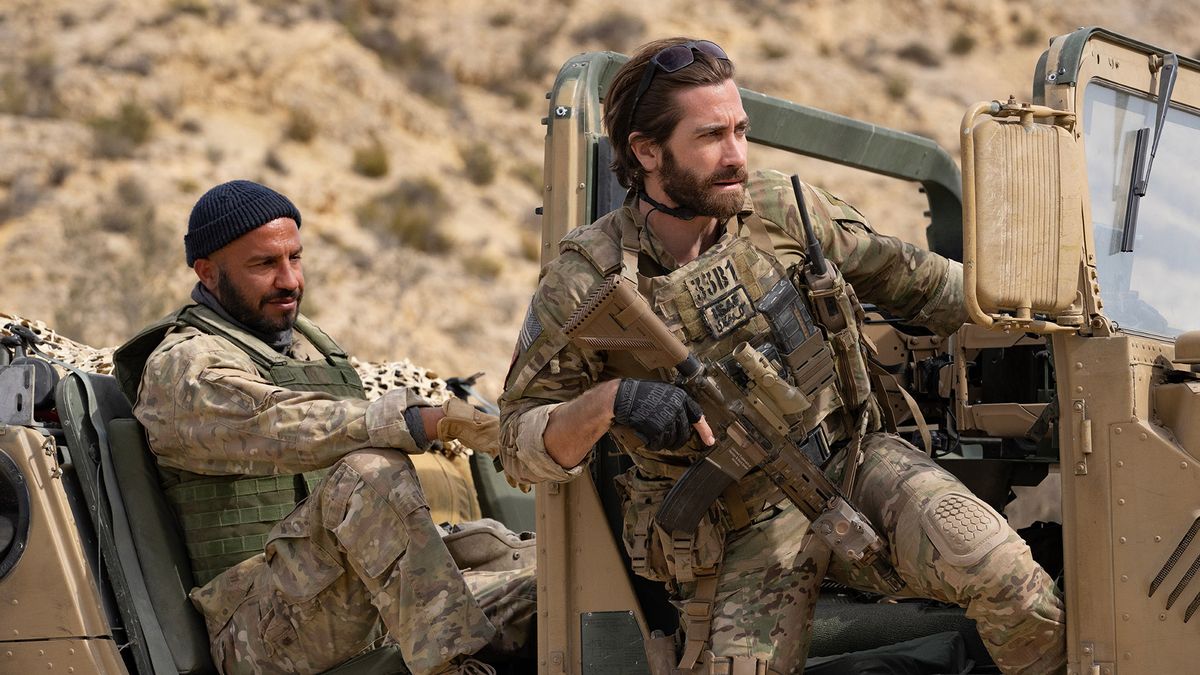
Although it may be officially called Guy Ritchie’s The Covenant, the new feature from the beloved British filmmaker doesn’t feel like a Ritchie flick at all. His usual directorial flourishes such as frantic jump cuts and offbeat dialogue are nowhere to be seen, as are the shirtless fisticuffs and sharply suited gangsters that are often featured in his work. As actor Dar Salim emphasizes to us, “this is not your typical Ritchie film, it’s a new type of Ritchie film”.
Salim stars as Ahmed, a local interpreter who is working for Sergeant John Kinley (Jake Gyllenhaal) during the Afghanistan War, risking his life day-in-day out to fight alongside the Americans. Exploring their relationship and complex bond, we see how the two embark on a Herculean effort to save each other when trouble brews. So, whilst it is indeed a war movie that features plenty of impressive action scenes, ultimately it is an emotionally affecting story about not necessarily friendship, but the beauty of humanity.
An "action parable"
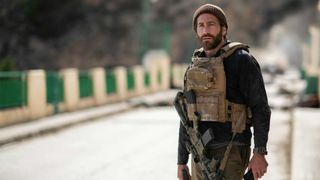
Speaking to 12DOVE, Gyllenhaal says that at the end of the day, the war setting doesn’t in any way define this movie: “It is set against the backdrop of a war but it’s really about these two human beings who have a debt to repay. I think it’s really a story about a very reluctant relationship. It’s ultimately an action parable about doing good begrudgingly. Essentially, without sentimentality doing good is just an action, something we do without much speaking about it.”
So much more unites us than divides us
The phrase “a very reluctant relationship” is definitely the best way to describe the dynamic between Ahmed and John. At first, they don’t even like each other let alone share a trust, but soon enough the parallels start shining through, especially when their lives become at risk. Salim believes that through this pair we see how actually all humans are more alike than we really realize: “The relationship is born out of an arranged marriage – they are totally dependent on each other. But as the story evolves it shows both sides – people from two very different cultures become relatable, they mirror each other. So much more unites us than divides us. They both just want to take care of their families and provide their children with better futures than they had themselves. We, as humans, all have it in us to do the right thing if we go past all the noise.”
No room for sentimentality
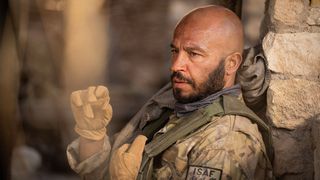
And “doing the right thing” in The Covenant is putting everything on the line to save a life, with Ahmed and John coming to each other’s aid no matter what it takes. We see what that costs them, both physically and emotionally, with a particularly moving scene seeing Ahmed take a moment to reflect, almost breaking down as he tries to get an injured John across dangerous land. Salim knew this would be a turning point: “I’m so glad that scene is there as these cracks in us, sometimes they need to grow bigger. He almost has a breakdown then pulls himself together. That wasn’t a scene in the script, it just happened on the day. I was pulling the cart around as usual and we just decided that we should maybe try seeing him give up for just a second, not crying, but having a moment.”
We aren’t lingering here – there is a respect to these characters
As that scene proves, whilst on their respective missions the pair never really have time to fully take in all the loss, pain, and agony they have gone through during the war. The Taliban are always hot on their tails so there’s no room to even shed a tear. At one point John loses his entire team and all he can do is continue running, rather than spend even a second in mourning. But as Gyllenhaal states, that unfortunately is the sad reality of these situations: “In other movies there would be a tremendous amount of sentimentality about the ability for someone to have an emotional response after going through such trauma. But in truth, you don’t have time for that in those moments. Me and Guy [Ritchie] spoke about that, and in that scene, it’s the camera that actually expresses the significance of that moment more so than the characters. Although he takes so much of what we know to be ‘Guy Ritchie style’ out of the movie there are a couple of moments where the camera pushes in and then pulls out really fast, which he does on both characters here, which is pretty profound. Even that camera movement lacks sentimentality, it isn’t slow, it just goes in and comes right back out again. We aren’t lingering here – there is a respect to these characters and the feelings they will then act upon, rather than the ones they would emote to an audience.”
Interpretation vs. translation
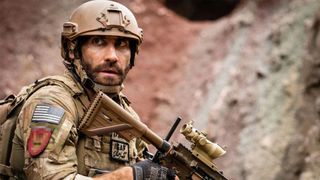
Our duo really do hold their emotional cards close to their chest, to both the audience and each other. In fact, there is very little dialogue between the two, with the pair mostly interacting through physical expression and even more simply, eye movement. For Salim this once again reflects real life as “we hold back our emotions in reality, but they come up in small cracks in spite of ourselves, and this is the language they are speaking in this movie”. As Ahmed emphasizes to John in the movie, “I’m not a translator, I’m an interpreter” which for Gyllenhaal is what makes this film stand out.
Sign up for the Total Film Newsletter
Bringing all the latest movie news, features, and reviews to your inbox
We would do a six to eight-line scene just through looks alone
“That’s one of my favorite lines too and is what makes this movie so special,” Gyllenhaal says. “It’s a film about behavior which is about interpretation, as opposed to being verbal which is about translation. That’s the essence. But we didn’t discover this until probably about two weeks into filming as that’s Ritchie’s process. He writes a 60-page script and then you go and discover it together. We found this style when I ended a scene with a spot of improv saying ‘there are a lot of dogs around here’ as there were! We shot this early on and I said it almost as a joke referring to Ritchie being auditory, not liking a lot of sounds around. I never thought he would use the take but he loved the line and cut it into a scene the next day. A week later we shot something else and were figuring out the dialogue. He told me to say that line again as there were a lot of dogs barking, so we needed something to get Ahmed’s attention. We learned that we had to say very little and there would be plenty of stillness and communication through looks. We would do a six to eight-line scene just through looks alone.”
Working with Ritchie
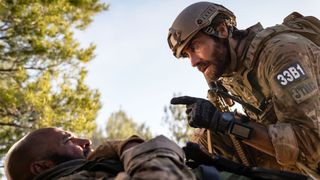
You may have gathered there that Ritchie has a very unique way of working, encouraging organic improvisation and the actors not to memorize any lines of the much-reduced script. For Gyllenhaal this was an exciting opportunity, admitting he relishes how every filmmaker has a totally different approach: “I revel in the wide variety of directors. The best part of being an actor for me is getting to experience these different worlds – you are there in their minds and this was a new one. I don’t believe anything in artistry should have rules or be done in a particular way. What matters is that there are creatives around trying to tell stories and the story is king. That’s what it was with Guy.”
I don’t believe anything in artistry should have rules
Salim agrees, but adds that he was nervous to sign onto the project as it would be his first major Hollywood role: “I was stepping into this international world working with Guy and Jake. The first week was scary as whilst you come prepared ready to show how good you are, you then have to throw that all away and just immerse yourself in the process. But once you do that, trust that you know what you are doing, and are surrounded by the right people, it becomes a wonderful journey. And I’ve actually worked with Guy since on his The Gentlemen TV show. I missed it and that was like coming home.”
We shall keep our eyes peeled for that early next year, but for now we have The Covenant, a moving two-hander which will likely take you by surprise with its depth and compassion.
Guy Ritchie's The Covenant is available to watch now on Prime Video in the UK. If you are then looking for something else to watch on that streaming service afterwards, check out our list of the best movies on Prime Video.

As Entertainment Editor at GamesRadar, I oversee all the online content for Total Film and SFX magazine. Previously I've worked for the BBC, Zavvi, UNILAD, Yahoo, Digital Spy and more.
Most Popular





